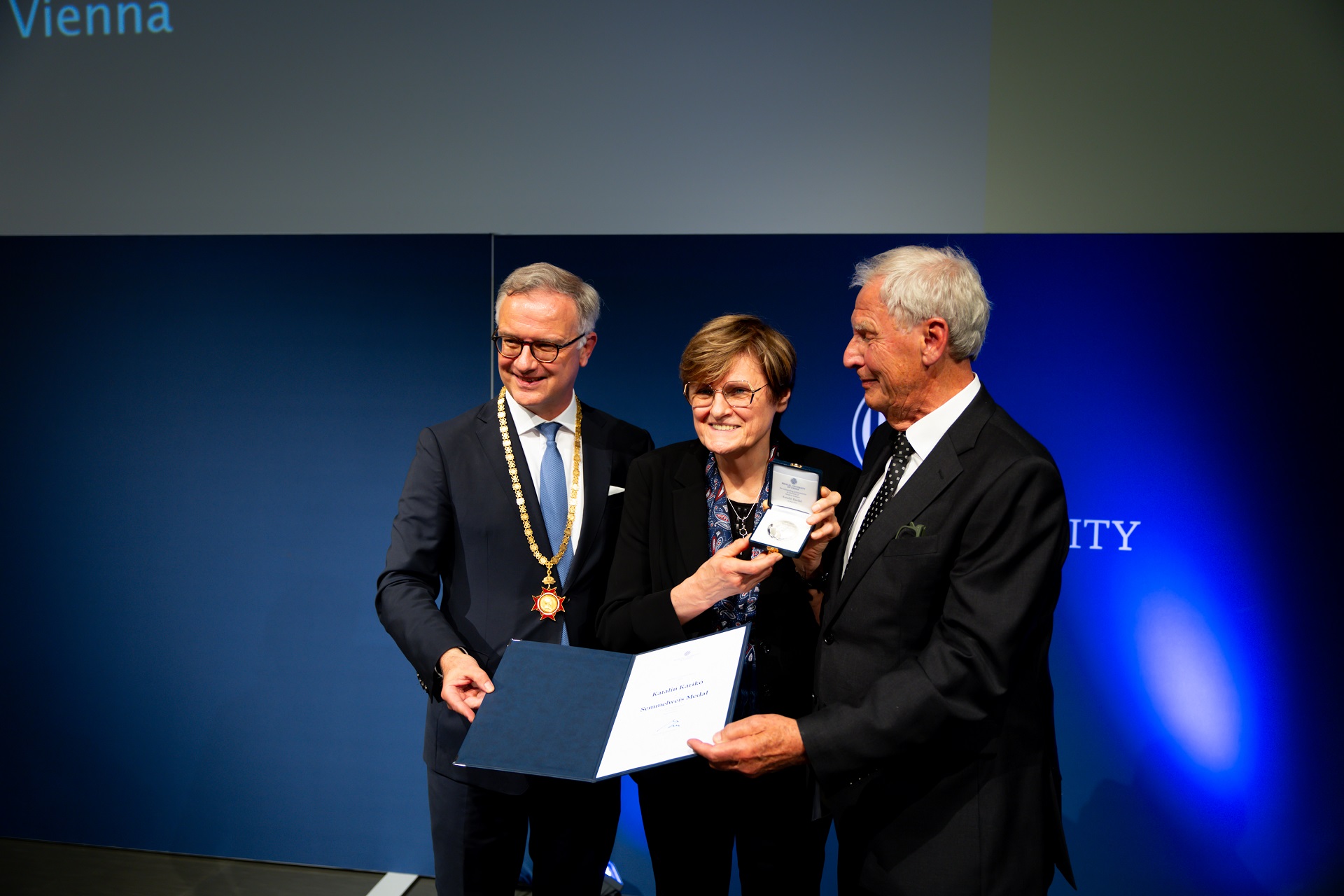
On May 19, 2025, Katalin Karikó was awarded an honorary doctorate and the Semmelweis Medal by the Medical University of Vienna. The Nobel Prize-winning professor from the University of Szeged delivered a lecture before an audience of nearly 900 people.
“We are delighted to welcome Katalin Karikó, a pioneer in medical science, to MedUni Vienna,” said Markus Müller, Rector of the Medical University of Vienna.

Nobel Laureate and University of Szeged Professor Katalin Karikó was greeted with a standing ovation at the Medical University of Vienna.
Photo: MedUni Vienna
“Katalin Karikó’s research on mRNA has fundamentally transformed the field of medicine,” emphasized the rector of MedUni Vienna. “Her discoveries open entirely new possibilities for treating diseases such as cancer and rare genetic disorders, and they lay the foundation for a new era of personalized medicine.”
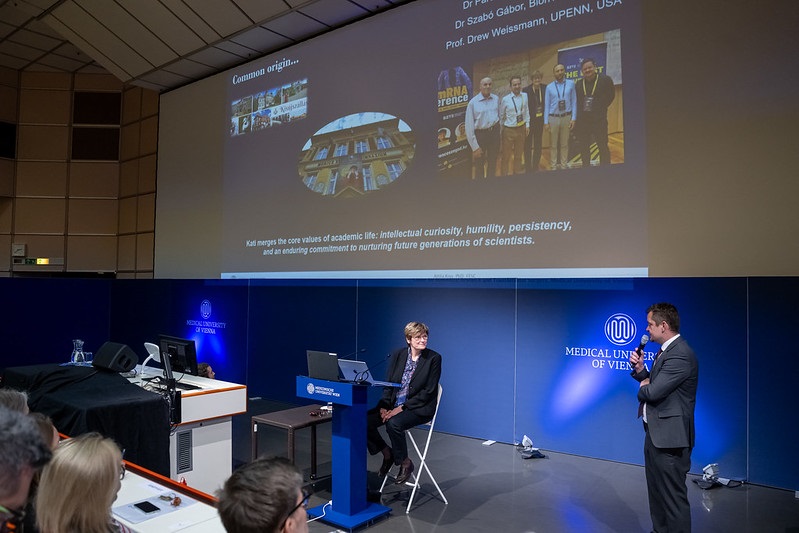
Two former students from the small Hungarian town of Kisújszállás – both biology majors in Szeged – attended the event at the Medical University of Vienna, where Attila Kiss highlighted key moments in Katalin Karikó’s life and also referenced the 2024 “mRNA Conference” held in Szeged.
Photo: MedUni Vienna
The life and career of the world-renowned mRNA researcher was outlined by Dr. Attila Kiss, an alumnus of the University of Szeged and associate professor at MedUni Vienna, where he heads the Cardiovascular Institute at the Center for Biomedical Research and Translational Surgery.
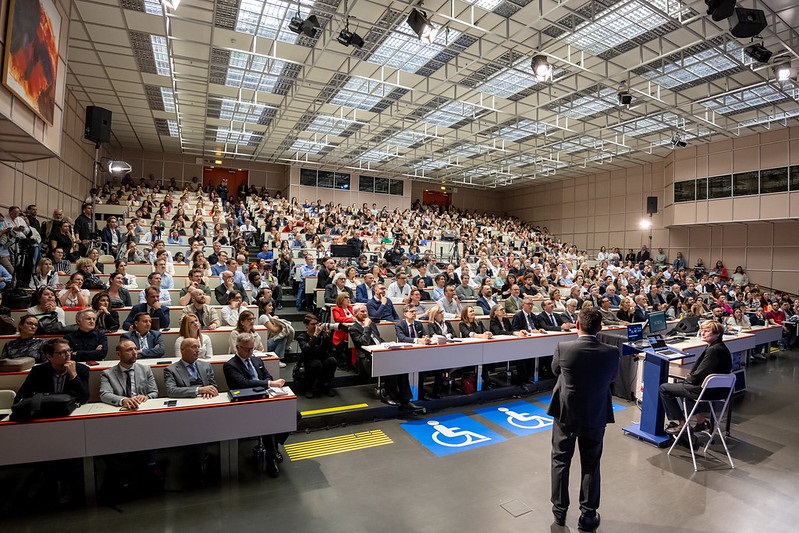
From Kisújszállás to Szeged and on to international research labs – that was the path of the two biologists. Dr. Attila Kiss earned his PhD in 2011 at the University of Szeged’s Institute of Pharmacology and has been working at the Medical University of Vienna for the past decade. He introduced Nobel Laureate Katalin Karikó to the audience in one of the university’s largest lecture halls.
Photo: MedUni Vienna

The honorary doctorate was presented to the Nobel Prize-winning researcher by Markus Müller, Rector of the Medical University of Vienna (Medizinische Universität Wien), and Professor of Medicine Christoph Huber, co-founder of BioNTech (pictured right).
The Medical University of Vienna awards the Semmelweis Medal as a mark of recognition for individual lifetime achievements and outstanding collective contributions.
 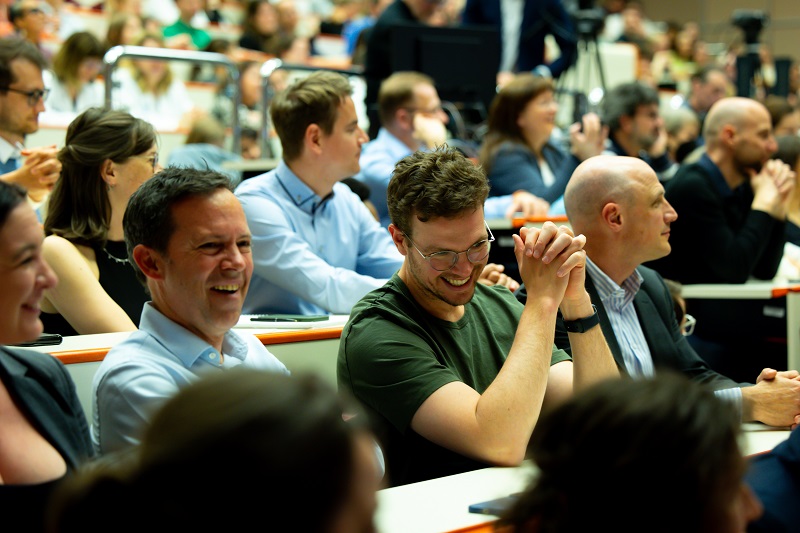   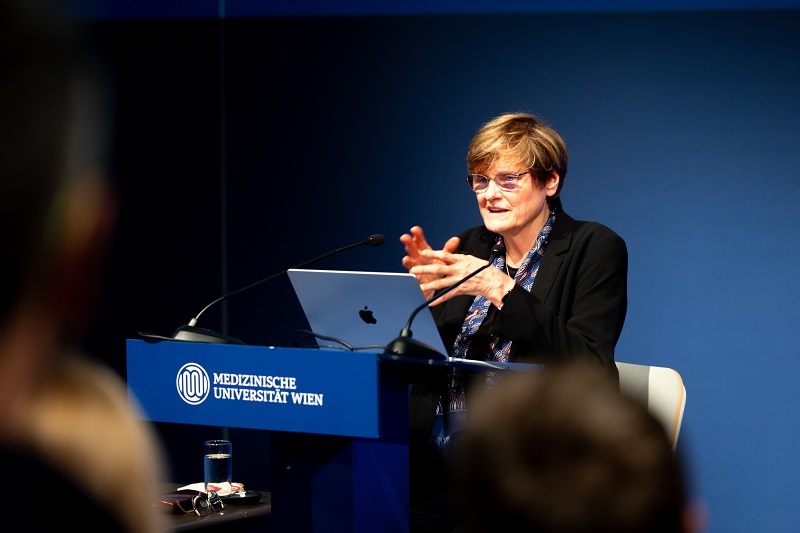 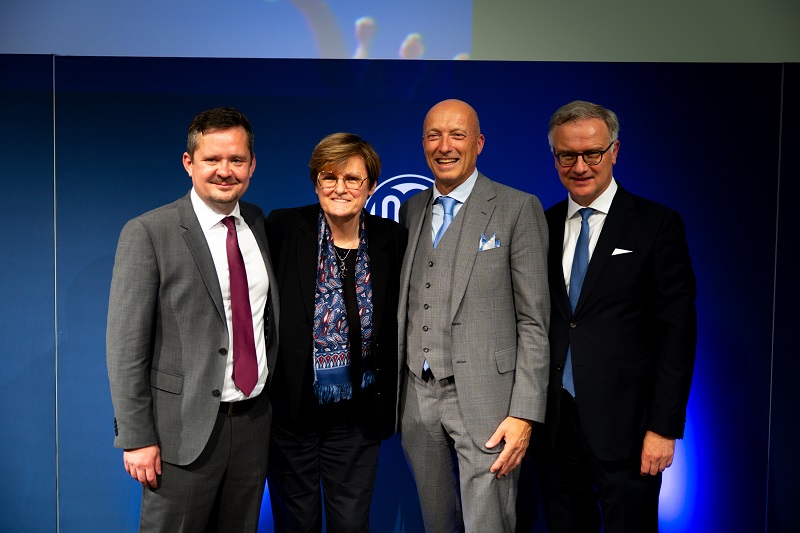 |
| Katalin Karikó delivered a lecture at the Medical University of Vienna. Photo Gallery by István Sahin-Tóth |

At the ceremony, the University of Szeged professor also received a personal gift – a reproduction of a painting by Gustav Klimt – from Rector Markus Müller and Professor Christoph Huber (right), co-founder of BioNTech.
Photo: MedUni Vienna
In her lecture, Katalin Karikó emphasized that groundbreaking discoveries typically originate in the academic sector and that the process of obtaining official approval for a drug is long and complex. She also stressed that scientific breakthroughs require more than research alone – gaining societal acceptance is equally important. According to Dr. Karikó, scientists have a responsibility to educate the public, explain their work, and demonstrate how scientific achievements ultimately serve the good of humanity.
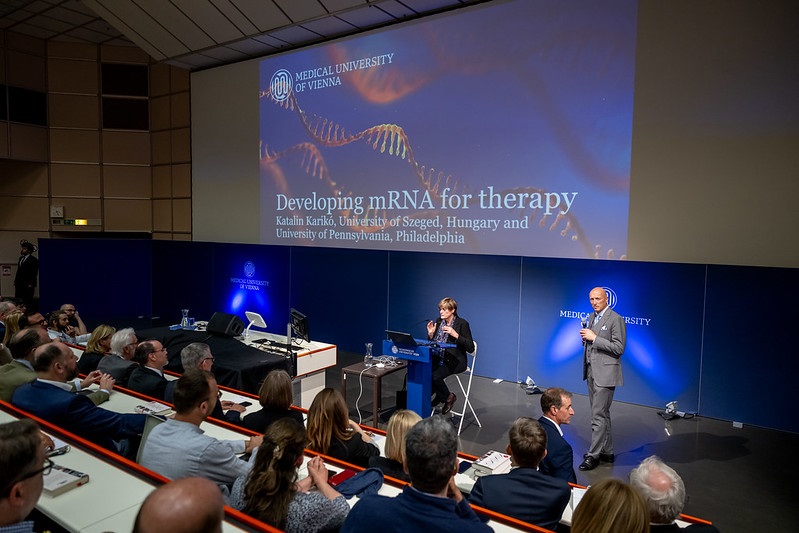
Speaking from personal experience, Professor Karikó traced the long journey from the discovery of RNA in 1961 to the development of the COVID-19 vaccine. Reflecting on her personal path, she shared that she chose to study in Szeged because the city had recently opened a biological research center. Her scientific career began there, in a lipid research laboratory, where she soon shifted her focus to RNA research.

At the age of thirty, after losing her job in Hungary, Katalin Karikó moved to the United States. She explained that her early research there focused on antiviral therapies, as the spread of HIV was the most pressing public health challenge in the mid-1980s.
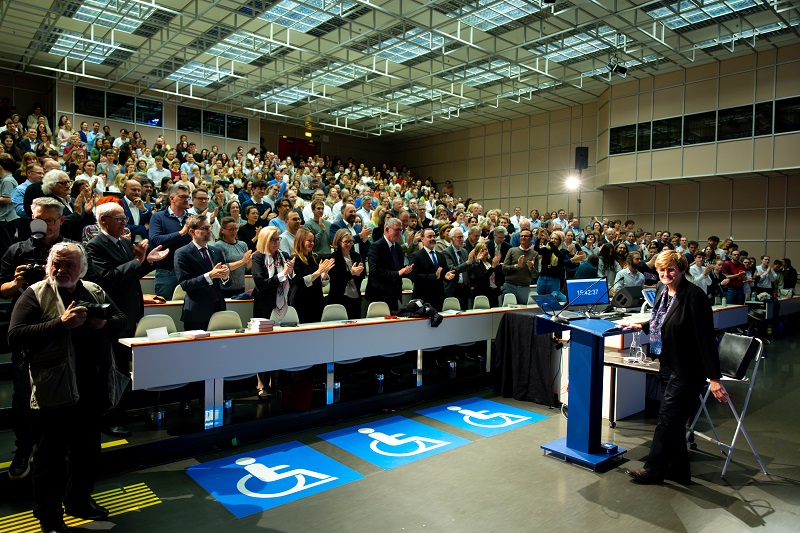
Professor Karikó recalled that during her joint research with Drew Weissman, they observed that mRNA triggered inflammatory responses when introduced into the body. However, after years of dedicated work, they developed a method using modified mRNA that not only avoids causing inflammation but also enables the mRNA to produce ten times more protein.
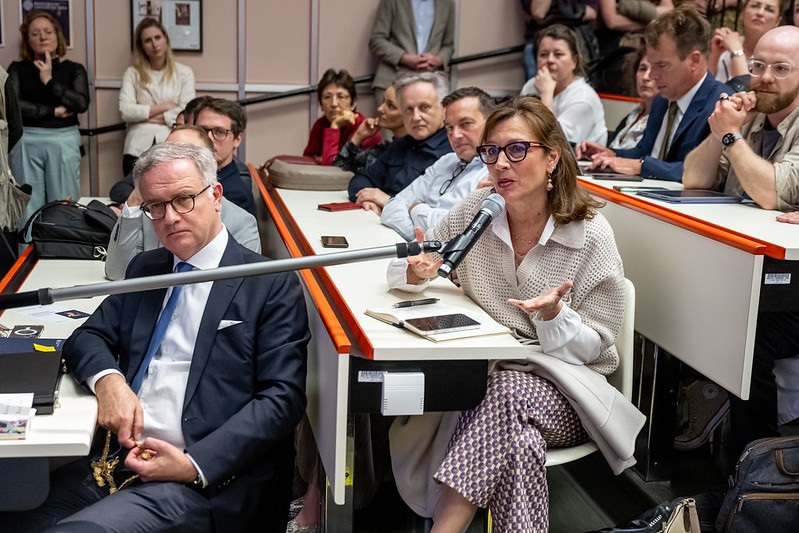
At the end of her lecture, the world-renowned mRNA researcher answered questions from the audience.
Photo: MedUni Vienna
Katalin Karikó explained that mRNA technology is significantly simpler and more cost-effective to develop than protein-based therapies. Currently, more than 150 mRNA-based treatments are undergoing clinical trials. She noted that such trials had already been underway before the emergence of COVID-19, but it was the pandemic that brought the technology into the focus of global scientific interest.

Speaking to an audience of nearly 900 – including university staff and students – Professor Karikó remarked, “We are privileged to be here and to work in science. That’s why, whenever we have the chance, we must thank our parents and teachers for making it all possible.”

Some of the key participants at the May 19 event at the Medical University of Vienna (from left to right): Attila Kiss and Katalin Karikó, both biologists with ties to Kisújszállás and the University of Szeged, followed by Bruno K. Podesser, Head of the Center for Biomedical Research and Translational Surgery, and Rector Markus Müller.
Photo: István Sahin-Tóth

Katalin Karikó also met with PhD students at MedUni Vienna to share experiences and insights.
Photo: MedUni Vienna
“It’s important for students to learn how to manage stress and stay focused so they can lead happy and productive lives,” said the Nobel Prize-winning researcher.
After her lecture, many attendees lined up – waiting patiently for the chance to receive a treasured autograph from the Nobel Laureate Katalin Karikó.

Two Hungarians in Vienna – At the Josephinum, the museum of the Medical University of Vienna, a Hungarian student asked Katalin Karikó to sign the exhibition guide for the University of Szeged’s Forever Forward exhibition.
.
Photo: MedUni Vienna
Source: MTI (Hungarian News Agency), SZTEinfo
Photos: István Sahin-Tóth, ©MedUni Wien / Harson

